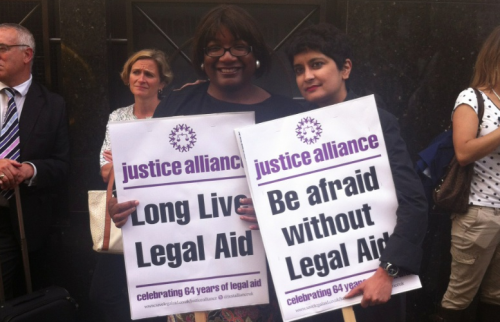Many people were failing to achieve justice because of an ‘exodus” of lawyers, according to a new report from the Bar Council exposing the ‘hostile climate’ of an underfunded civil legal aid system. The new report, Running on Empty, draws on interviews with barristers and clerks and claims that government cuts were forcing many barristers to ‘stand-in’ for roles that should be done by other public services. ‘You are half social worker, half handler, part counsellor and then advocate,’ said barrister John Edwards.
The report identified a ‘new and worrying’ concern that civil barristers feel attacked by the government. Stephanie Harrison QC said, the government does ‘literally see those who practice in legal aid as just a thorn in their side… . [this] is a new and dangerous development of delegitimising and vilifying lawyers who seek to hold the government to account.’ These findings come eight years after the Legal Aid, Sentencing and Punishment of Offenders Act (LASPO) 2013, which took many areas of civil law out of the scope of legal aid, including spcial welfare lawyer, employment, inquests and immigration.
The newly-appointed chair of the Bar Council, Derek Sweeting QC, claimed that the civil legal aid system had only survived championed as a result of the ‘goodwill of the legal profession’. He cautioned, however, that ‘this is not a sustainable way to guarantee the future of such an essential service for the public… The Bar Council has consistently called for a reversal of LASPO, which took many areas of legal aid funding out of scope. Eight years later, we continue to see its damaging effects. We now find ourselves pleading for the bare minimum. We urge the Government to heed the findings of this report and seek to meet the Bar’s commitment to social duty and access to justice with some proper investment in, and respect for, the justice system.’
Lawyers describe having to “battle” against decisions of the Legal Aid Agency (LAA), which often feel arbitrary. ‘The process of applying for funding is specifically designed to be hard and to discourage people from bringing cases,’ said Emma Manning, the senior civil practice manager at Garden Court Chambers. The lack of any clear guidance and transparent processes has led to the perception of a ‘culture of refusal’ at the LAA.
LASPO has crippled the ability of citizens to access justice and the report highlights the ‘profound impact’ it has had on the legal services sector. The widespread closures of legal advice centres and high street solicitors, for example, makes cases more complex and urgent. Clients no longer have front-line access to good quality, early legal advice which means cases unnecessarily go to court, costing excessive time and money.
Jason McDonald, a housing barrister, said: ‘I’m concerned that there’s work out there that is not being addressed because there are deserts in the sense of people not being able to get hold of a lawyer.’ This has led to a dramatic rise in the number of people being forced to represent themselves in court. In 2017/18, only 36% of parties were recorded as having legal representation in private law cases that had at least one hearing, compared to 58% of parties the year before LASPO.
The issue of inequality of arms was found mostly pointedly in inquests. Bereaved families are entitled to legal aid in only limited circumstances and decisions on funding are often made late. Junior barristers are paid such low fees that they do not have time to fully prepare a case, despite their unwavering efforts against the odds. Government agencies, on the other hand, often have the benefit of more experienced counsel. Sarah Hemingway, a barrister at Garden Court Chambers said, parents are ‘left with no funding whatsoever, and they’re the ones that are really needing the questions answered … we’re not doing our duty towards them at all’.
An underfunded service is causing legal aid lawyers to work 60-70 hours a weeks and there was a concern that work for junior lawyers was becoming ‘unsustainable’. A heavy caseload and costly expenses risks junior lawyers burning out or leaving the profession altogether. ‘The real sadness in me is that when I see younger people now coming to the Bar, I’d never recommend them doing only legal aid work, and that’s a travesty, it’s an absolute travesty,’ said Sonali Naik QC.





